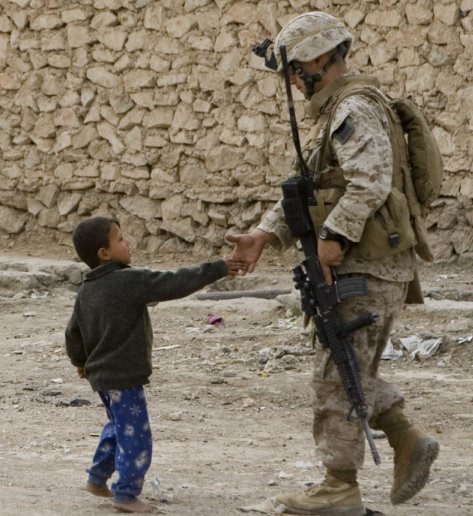
You don’t learn from experience unless you pay close attention. Failure focuses the mind. We ask what went wrong and identify improvements. As often, however, we don’t fix the problem but try to fix the blame. This absolves everybody else and lets us all continue business as usual. We can find individuals who made poor decision, but the only way to systematically improve is to look at the whole system and analyze the interactions. If you have a dysfunctional system, changing the players doesn’t help.
There is a currently popular saying that “doing the same thing and expecting different results is the definition of insanity.” This is simplistic. It is possible to flip a coin ten times in a row and get all heads, but still expect the probability of the next toss to be even, at least after checking the coin. A good system with good people may produce poor results. That is why you study the processes. If you can identify the factors the led to the result and they are not likely to recur wholesale changes are unjustified.Success brings less soul searching than failure. We point to good results and are unenthusiastic about checking to see if they were deserved. But just as it is possible to fail for reasons beyond our control or factors unlikely to recur, we can succeed for the same bad reasons, so success should be as closely scrutinized as failure. There is no shortage of talk about failures in Iraq, although much of it is designed to fix the blame not the problem. As it becomes clearer that we are succeeding, we should learn from what went right and how it might be transferred elsewhere. I have a couple ideas from my own point of view. Keep in mind that I have personal knowledge only of events in Western Anbar and so I emphasize factors and people acting here. My list is not comprehensive.
Leadership
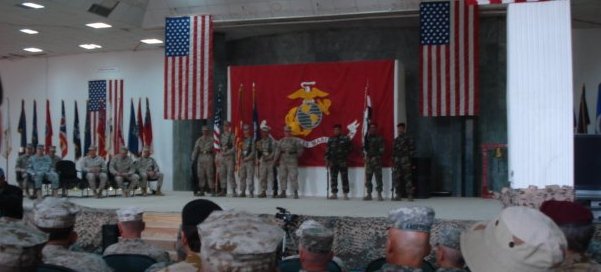
Had Abraham Lincoln had stuck with General George McClellan, or the American people elected “Little Mac president in 1864, we might well need a passport to cross the Potomac. Leadership changes the course of human events and a change in leadership was essential to the turn around in Iraq.
It does not follow, BTW, that previous leadership was incompetent (remember fix the problem, not the blame), just not appropriate. McClellan was a superb general. In a defensive posture, he was great. He just didn’t grasp what he had to do to win and didn’t have the temperament to do implement it. That task eventually fell to Ulysses S. Grant. Lincoln found his general in a man who had been unsuccessful in his earlier endeavors but had the appropriate skills, talents and temperament to handle this job.
General David Petraeus was the right man for the new strategy in Iraq in 2007. He wrote the book on counter insurgency and recruited a first class-team to help him with the changes. He also had the support the new Defense Secretary, Robert Gates, to make the needed adjustments.BTW – the COIN Manual is itself a great example of the flexible strategy it advocates. It is a living document, almost a wiki. As new experience is analyzed and digested, it changes and evolves.
The right leadership with the right strategy was essential to success, but causality is never so uncomplicated.
Marines
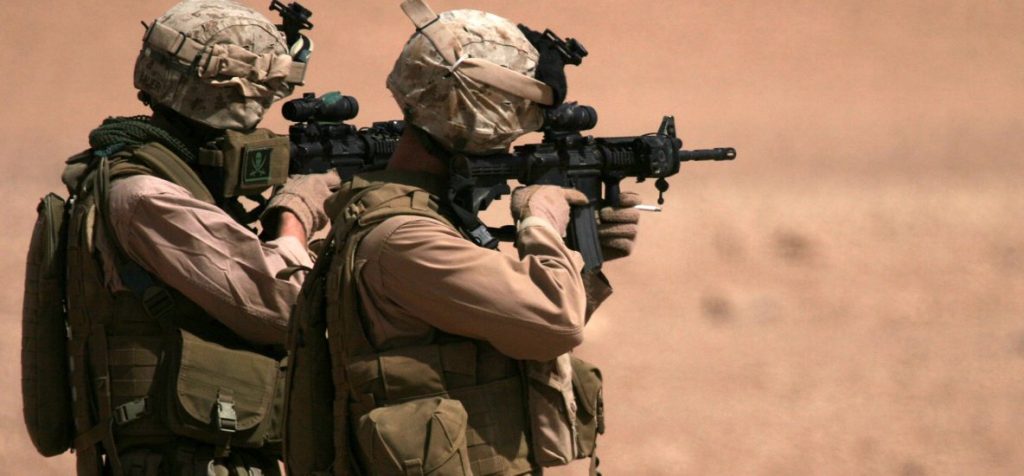
The USMC was employing the “new paradigm” in Al Anbar before it became part of a new strategy. Marine commanders were well familiar with the theory and practice of counter insurgency, but as importantly the Marines in Al Anbar constituted a learning organization. As experience about what worked and what didn’t passed through the organization, Marines adapted and improved their responses. The Marines have a long history with counter insurgency and working with indigenous forces going back at least to Presley O’Bannon on the shores of Tripoli, where they earned the Mameluke sword Marine officers still carry. And they have been a learning organization all that time.
Another advantage is the Marine’s rotation system. Marines tend to come back to places near their last deployment bringing with them their experience enhanced by the perspective of their time away. Beyond that, when Marines go back they share their experience with their colleagues coming out, both formally and informally. It is hard to envision a better system for learning and adapting. Many of the Marines in Anbar today were in Fallujah or Hadithah during the bad times a couple years ago. More than others, they see the progress and understand what still needs to be done. Those who are here for the first time have heard and internalized the stories.
Beyond that, Marines in Anbar did what they do well: eliminating bad guys & breaking their stuff; making friends in that unique Marine Corps way; adapting & overcoming. When the surge came, the Marines were ready with a receptive environment they helped create.
A Time for Peace
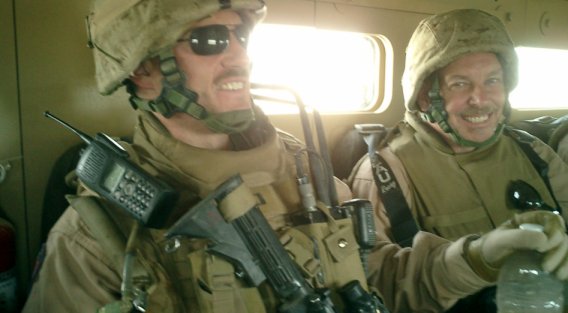
“To everything there is a season and a time for every purpose under heaven … a time for war and a time for peace.” (Ecclesiastes 3:1-8). Early in the conflict, proud and martial Anbaris allied with Al Qaeda and other insurgent forces to fight against the American invaders. It was an understandable, if mistaken response, but by the close of 2006, they were tired of war; they had come to understand the folly of working with retrogrades such as Al Qaeda and their sense of honor was satisfied and slaked by the casualties they had suffered and those they had inflicted. Al Qaeda told them that the Americans would cut and run. Marines don’t. Anbaris learned to respect CF forces. As importantly, they came to understand that CF forces had come to respect them and it was the beginning of a beautiful friendship.
PersistenceYou cannot achieve success if you do not stick around long enough to achieve it. Difficult and unexpected circumstances in Iraq provided many excuses to give up. Leading experts, pundits and even members of the U.S. Congress told it straight-out that the U.S. was defeated. They were wrong, but they could have been right if we had acted on their advice. In other words, a lack of resolve on our part would have made their prophecies self-fulfilling. In the event, the U.S. stayed for the turn around.
Luck
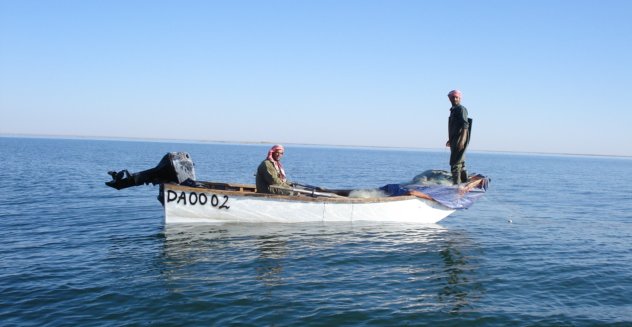
Risk can be controlled but never eliminated and pure uncertainty lurks beyond all the risks we can calculate. Even the most exquisite plans must run the gauntlet of random chance that can devastate a perfect plan or vindicate a dreadful one, which is why we have to analyze the process and not judge strictly by results, as I said above.
Early in the conflict, many things turned out worse than we reasonably anticipated. Now things have changed. Our enemies turned out to be poorly organized. Often incompetently led and ideologically myopic, they made stupid mistakes that turned local populations against them. Fighting an insurgent enemy can be like playing whack-a-mole. It is a frustrating game, but it is easier if the moles are not very clever. I don’t want to take this too far. Many of our opponents are committed, deadly and dangerous and even in small numbers a ruthless adversary can inflict severe suffering, especially if their goal is to attack civilian populations. But these very tactics erode their support.The big piece of good luck is the flip side of some very bad luck for the rest of the world – soaring oil prices. Iraq recovered its previous ability to produce oil almost at exactly the time world oil prices spiked. During Saddam’s time, Iraq earned oil revenues of around $20 billion a year. Experts anticipated revenues at this time of around $35 billion. Last time I heard, they were looking at $80 billion and the number keeps on growing. Oil money lubricates and more and more often Iraqi funds can pay for the needed infrastructure upgrades and improvements in Iraq.
PRTs, ePRTs and the Holistic Approach
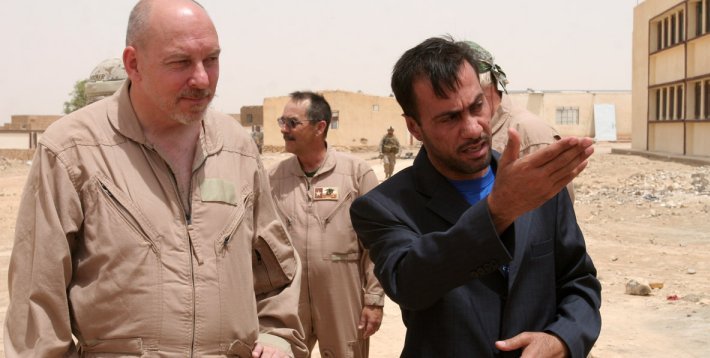
Of course I have to talk about my own stuff. You cannot win a modern war by military means alone. COIN Manual says that some of the best weapons do not shoot. Military units have long had Civil Affairs (CA) teams and Commanders’ Emergency Response Funds CERP. These improved conditions for Iraqis and certainly saved many lives. Building on this success and experience in Afghanistan, in November 2005, Secretary of State Rice established Provincial Reconstruction Teams (PRTs) in Iraq. In January 2007, President Bush announced the establishment of embedded PRTs, who work directly with military units such as Regimental Combat Teams.
These were civil-military teams of experts who engaged provincial and local Iraqi officials as well as ordinary Iraqi citizens. Some of their work was old fashioned diplomacy, meeting people, talking to them and listening to concerns. But unlike diplomats in many other contexts, PRT members have access to concrete resources. This development aspect, helping rebuild or in many cases just build for the first time is not entirely new, but putting it together with the interagency team of experts that made up a PRT is breaking some new ground.
PRTs are led by a senior State Foreign Service Officer with a deputy from USAID or a military colonel often as an executive officer. Included on the team are experts on budgeting, industry, law and agriculture, among others.
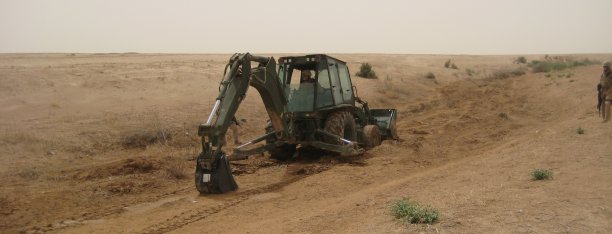
In rebuilding Iraq, damage from the 2003 invasion is often the least of our problems. Iraq has been in a state of war and/or sanctions for nearly thirty years. Many things decayed during that time and other things that could have been done never were. The Saddam Hussein regime did minimal or no maintenance on the plant & equipment. The whole country suffered the kind of socialist mismanagement seen in former communist regimes, but with an additional layer of sanctions and war. It might have been better if some of the facilities had been destroyed by CF bombs and could be rebuilt from scratch.The physical damage can be repaired more easily than the damage to human capital. The late despotism actively destroyed most aspects of civil society, anything that might insulate the people from the dictates of the state. In former communist Europe, it was possible to find functioning civil organizations, as the fiercest aspects of Stalinism were generations in the past. In Iraq, the destruction was more recent and in some ways more though going. Ironically, sanctions and isolation helped finish the demolition Saddam started. The only viable non-governmental structure left were family/tribes and religion.
Iraq has a significant, if now distant, tradition of reasonably competent officials. PRT experts work to revive this and build on it. Iraqis are responding very quickly, considering the conditions.The most popular expert in Western Al Anbar is our agricultural advisor. Iraq was once a bread basket and still has wonderful soils, available water and a skilled population. Unfortunately, some of the best agricultural lands has been abused for thousands of years. Saddam’s mismanagement exacerbated it, but I digress.
COIN talks about the need to clear, hold & build. CA, CERT & PRTs have helped build physical infrastructure as well as relations. The Iraqi people increasingly have a commitment to their own future and freedom. They will not easily give it up when terrorists come calling.
What They Said Can’t be Done
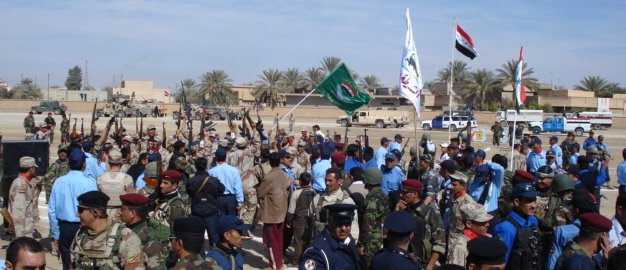
The U.S., CF and Iraqi accomplishment is astonishing, especially when you consider the near-death experiences of 2006. The Middle East is more secure w/o the murderous Saddam Hussein in power and it is immensely better off than it would have been had we failed in 2006. I believe this will be seen by future historians as a paradigm shifting event. For awhile many people feared that the initiative had passed to the bad guys or at least to the forces of chaos. The apparent disintegration of our position in 2005/6 seemed to confirm that impression. It was never as bad as it seemed or as bad as it was portrayed in the media, but the trend was unmistakable. Today we have come out of the darkness into a new morning. It is still a little too dark to see clearly all the features and it is still full of challenge and fraught with dangers but also full of opportunities. For the last generation and arguably since the end of World War I or the Sykes-Picot accord, this region has been unstable and dangerous. Maybe we can help make the future better than the past.
Our Iraqi friends deserve it.
